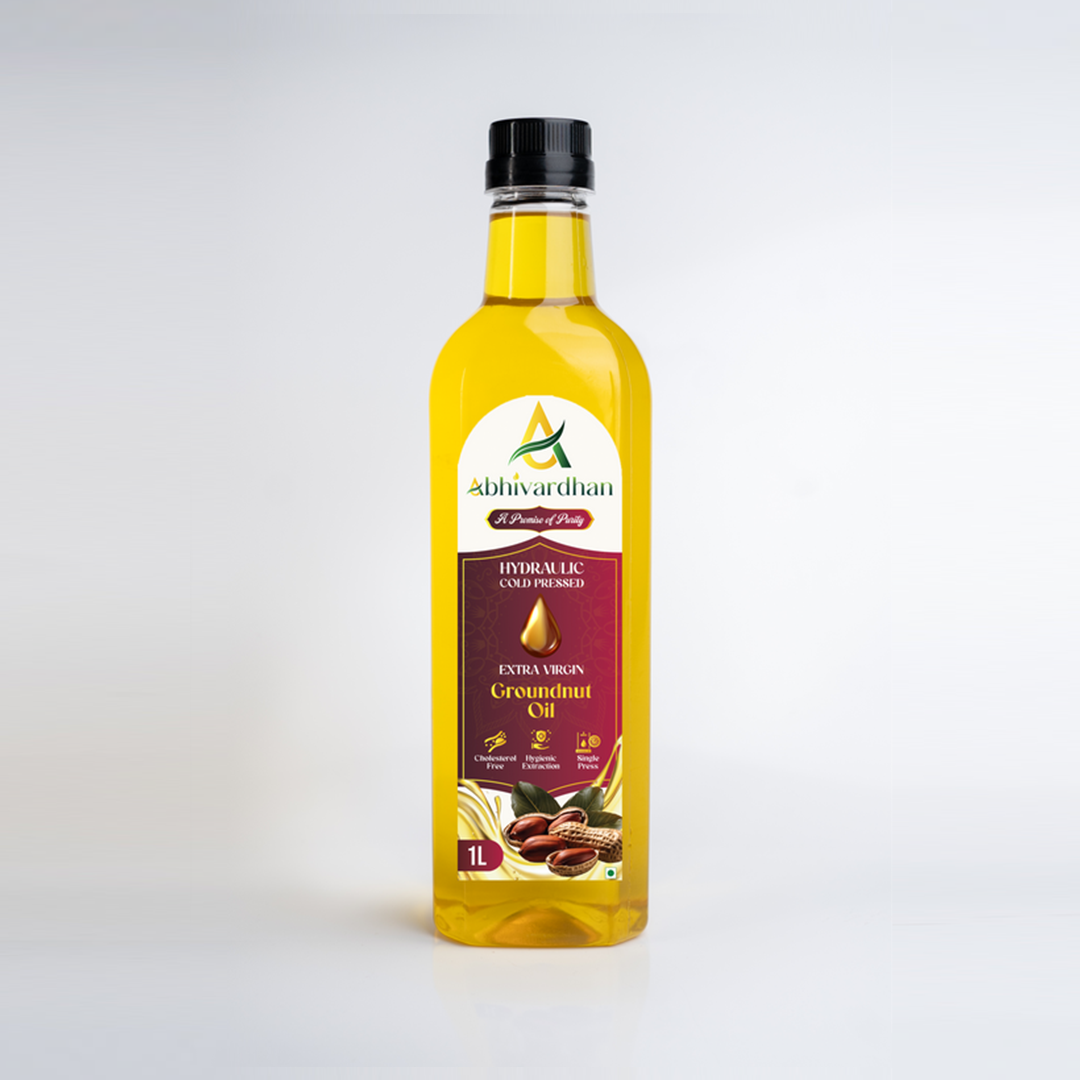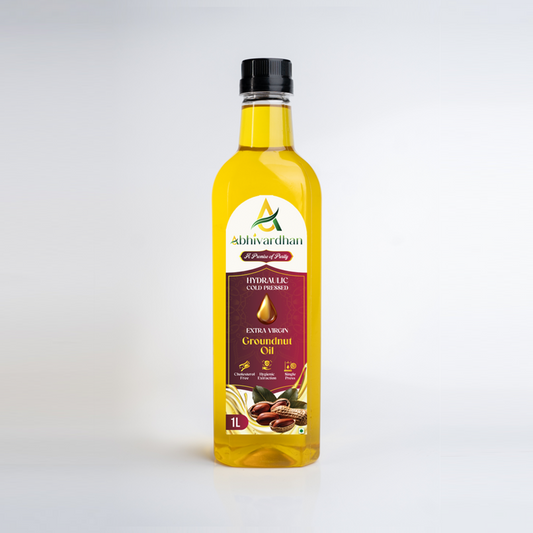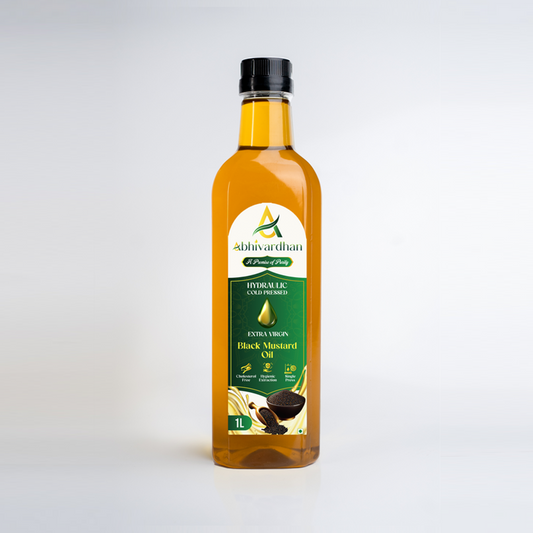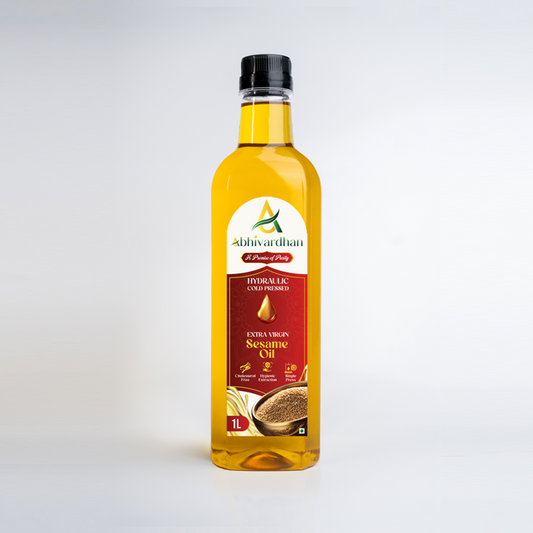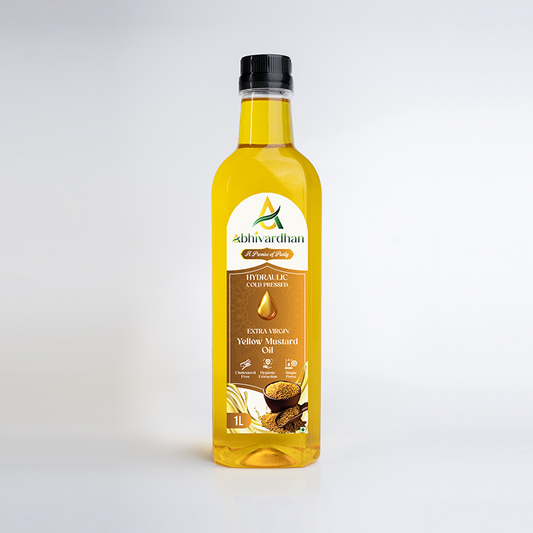
Cold-Pressed Oil vs Refined Oil: What’s Better?
Share
Cold-Pressed vs. Refined Oil: What’s the Real Difference?
I used to think all cooking oils were created equal—until I started noticing how some oils tasted richer, smelled more natural, and seemed to settle better with my stomach. If you’ve ever wondered why there’s such a buzz around cold-pressed oils—or if refined oils really deserve the criticism they get—this blog is for you. Let’s dive into the sizzling world of oils and discover what sets cold-pressed and refined varieties apart!
Table of Contents
- Understanding the Basics: Oil Extraction Methods
- What Are Cold-Pressed Oils?
- Benefits of Cold-Pressed Oils
- What Are Refined Oils?
- Disadvantages of Refined Oils
- Cold-Pressed vs. Refined: Nutritional Showdown
- Taste, Aroma, and Culinary Uses
- Shelf Life and Storage Tips
- Choosing the Right Oil for Your Needs
- Why Abhivardhan Cold Pressed Oils Are a Cut Above
- Frequently Asked Questions
- Conclusion: Making the Healthier Choice
1. Understanding the Basics: Oil Extraction Methods
Before we compare cold-pressed vs. refined oil, let’s clarify what these terms actually mean:
- Extraction Method: How an oil is pulled out of seeds or nuts. Temperature, chemicals, and machinery all play a role in determining the oil’s final quality, flavor, and nutritional content.
- Cold-Pressed Extraction: This process uses minimal heat and mechanical pressure, keeping temperatures below a certain threshold (often around 40-50°C). This method helps retain the oil’s natural flavors and nutrients.
- Refined Extraction: Typically involves higher temperatures, chemical solvents (like hexane), and additional processes like bleaching and deodorizing. This is done to produce a clear, uniform oil with a longer shelf life.
When I first learned about these methods, it dawned on me that oil extraction isn’t just about pulling liquid fat from seeds—it’s a delicate dance that can greatly affect the final product.
2. What Are Cold-Pressed Oils?
Cold-pressed oils are produced by mechanically crushing seeds or nuts. The name “cold-pressed” comes from the fact that minimal heat is generated during the process. Lower temperatures preserve the oil’s natural molecular structure, retaining essential nutrients and antioxidants.
Popular Cold-Pressed Oils
- Mustard Oil: Known for its pungent aroma and anti-inflammatory properties, it’s a staple in many Indian kitchens.
- Sesame Oil: Valued in Asian cuisines, it has a nutty flavor and is rich in antioxidants.
- Black Mustard Oil: Similar to regular mustard oil but often considered bolder in flavor and aroma.
- Groundnut Oil: A versatile option with a light flavor, perfect for frying and sautéing.
3. Benefits of Cold-Pressed Oils
-
Higher Nutritional Value
With minimal exposure to heat, cold-pressed oils generally retain more vitamins (like Vitamin E), minerals, and antioxidants. -
Richer Flavor Profile
Because they’re less processed, cold-pressed oils maintain the natural taste and aroma of their source seeds or nuts. -
Potential Health Benefits
- Heart Health: Some cold-pressed oils, like groundnut and sesame, contain heart-friendly monounsaturated and polyunsaturated fats.
- Skin and Hair: High levels of Vitamin E and antioxidants can benefit skin elasticity and hair health.
- Digestive Aid: Many people find cold-pressed oils easier on the stomach due to the lack of chemical residues.
-
Environmentally Friendly
Fewer chemicals in the extraction process mean less environmental impact. Plus, cold-pressed oil production often yields less waste and can be done on a smaller, more sustainable scale.
4. What Are Refined Oils?
Refined oils undergo multiple stages to strip away impurities, odors, and often color. Common steps include:
- Degumming: Removal of phospholipids, which can cause gum formation.
- Neutralization: Removal of free fatty acids using chemical agents.
- Bleaching: Filtering through clays to make the oil lighter in color.
- Deodorizing: Steam distillation to remove strong odors.
The end goal? A pale, odorless, and consistent product with a long shelf life. While this might look appealing on the supermarket shelf, there’s a hidden price in terms of nutrient loss and potential chemical residues.
5. Disadvantages of Refined Oils
-
Nutrient Depletion
High temperatures and chemical processes can destroy or diminish beneficial compounds like antioxidants and vitamins. -
Possible Chemical Residues
While food safety regulations limit the level of solvents like hexane, there’s still a possibility that trace amounts could remain in the final product. -
Altered Flavor
Refined oils often lose their unique flavor and aroma, which might be a downside if you’re looking to add that special nutty or spicy touch to your dishes. -
Health Concerns
Refined oil disadvantages may include higher levels of trans fats if hydrogenation is part of the process, which can be detrimental to heart health.
6. Cold-Pressed vs. Refined: Nutritional Showdown
| Aspect | Cold-Pressed Oil | Refined Oil |
|---|---|---|
| Extraction Method | Low-temperature mechanical pressing | High heat, chemicals, deodorizing |
| Nutrient Content | Retains most vitamins & antioxidants | Many nutrients lost or degraded |
| Flavor & Aroma | Natural, distinctive | Mild or neutral |
| Shelf Life | Moderate | Generally longer |
| Health Profile | High in unsaturated fats; minimal processing | May contain traces of chemical residues |
7. Taste, Aroma, and Culinary Uses
One of the joys of cooking is experimenting with flavors. Cold-pressed oils—especially mustard, sesame, or groundnut—have robust, aromatic qualities that add complexity to dishes:
- Mustard Oil (Cold-Pressed): Ideal for Indian curries, pickles, and stir-fries.
- Sesame Oil (Cold-Pressed): Perfect for Asian stir-fries, marinades, and dressings.
- Black Mustard Oil (Cold-Pressed): Fantastic for drizzling over roasted vegetables for a spicy kick.
- Groundnut Oil (Cold-Pressed): Great for deep-frying, sautéing, and baking.
Refined oils, on the other hand, have a neutral flavor, which can be beneficial for recipes where you don’t want the oil to stand out. However, if you want that extra layer of taste, cold-pressed oils are the way to go.
8. Shelf Life and Storage Tips
Cold-Pressed Oils: Typically have a shorter shelf life than refined oils because they contain natural sediments and nutrients that can degrade over time. Store them in cool, dark places to extend freshness.
Refined Oils: Treated with chemicals and heat, they last longer on the shelf. However, once opened, they still require proper storage to prevent rancidity.
Pro Tip: To maximize the shelf life of your Abhivardhan Cold Pressed Oils, keep them in a dark glass bottle (or a stainless-steel container) away from direct sunlight. Always ensure the bottle is tightly.
9. Choosing the Right Oil for Your Needs
While cold-pressed oils often come out on top in terms of health benefits and flavor, the best choice ultimately depends on your cooking style and health goals.
- High-Heat Cooking: If you’re planning on deep-frying at very high temperatures, certain refined oils might have a higher smoke point. However, many cold-pressed oils like groundnut or sesame also handle moderate to high heat well.
- Raw Use (Dressings & Toppings): Cold-pressed oils add a burst of flavor and nutrients to salads, dips, and garnishes.
- Budget & Availability: Refined oils are often cheaper and more widely available. Cold-pressed oils can be slightly more expensive due to their extraction method, but many argue it’s worth the cost for the nutrient density and flavor.
10. Why Abhivardhan Cold Pressed Oils Are a Cut Above
When I discovered Abhivardhan Cold Pressed Oils, I was instantly drawn to their commitment to quality:
- Traditional Techniques: We use age-old extraction methods that protect the seed’s natural properties. No harsh chemicals, no shortcuts—just pure, wholesome oil.
- Single-Origin Seeds: Each bottle is made from carefully sourced seeds, whether it’s mustard, sesame, black mustard, or groundnut. This ensures consistency in flavor and nutrients.
- Minimal Processing, Maximum Goodness: Our cold-pressing techniques maintain the beneficial fatty acids, vitamins, and antioxidants—so each drizzle works harder for your health.
- Taste the Difference: From the peppery kick of mustard oil to the nutty notes of sesame and groundnut, Abhivardhan offers a flavor profile that refined oils simply can’t match.
- Transparent Practices: We believe in honesty—what you see on the label is what you get. No hidden chemicals, no ambiguous processes.
Ready to experience the Abhivardhan difference? Shop Now and elevate your cooking with the pure goodness of cold-pressed oils!
11. Frequently Asked Questions
Q1: Are cold-pressed oils safe for high-temperature cooking?
Yes, certain cold-pressed oils (like groundnut and sesame) have relatively high smoke points and can be used for most frying needs. However, always monitor the temperature to avoid burning.
Q2: Why do cold-pressed oils sometimes look cloudy?
That cloudiness is a natural sediment of nutrients and fibers from the seeds. It’s a hallmark of minimal processing and is perfectly safe to consume.
Q3: Can I substitute refined oil with cold-pressed oil in baking?
Absolutely! Cold-pressed groundnut oil or sesame oil can be a flavorful alternative. Do note that the flavor might be more pronounced, which can actually be a great twist in certain recipes.
Q4: Do cold-pressed oils cost more than refined oils?
They can be slightly pricier due to the intricate extraction process and smaller yield, but many people find the superior taste and health benefits worth the investment.
Q5: How long can I store cold-pressed oils?
Most cold-pressed oils remain fresh for about 6-12 months. Make sure to store them properly—tightly sealed in a cool, dark place—to preserve their quality.
12. Conclusion: Making the Healthier Choice
In the grand debate of cold-pressed vs refined oil, cold-pressed varieties stand out for their health benefits, full-bodied flavors, and sustainable production methods. While refined oils offer a certain level of convenience and longer shelf life, the disadvantages—such as nutrient loss and potential chemical residues—can’t be ignored.
If you’re aiming to elevate your cooking and give your body more natural nourishment, cold-pressed oils are an excellent choice. And if you’re wondering where to start, look no further than Abhivardhan Cold Pressed Oils. From mustard to sesame, black mustard, and groundnut, each bottle delivers purity you can taste and benefits you can feel.
Make the switch to better health and flavor today. Explore our range and experience the authentic taste of cold-pressed goodness!
Thank you for reading! If you have any more questions or want to learn more about the incredible world of cold-pressed oils, feel free to reach out. Happy cooking—and healthier eating!
